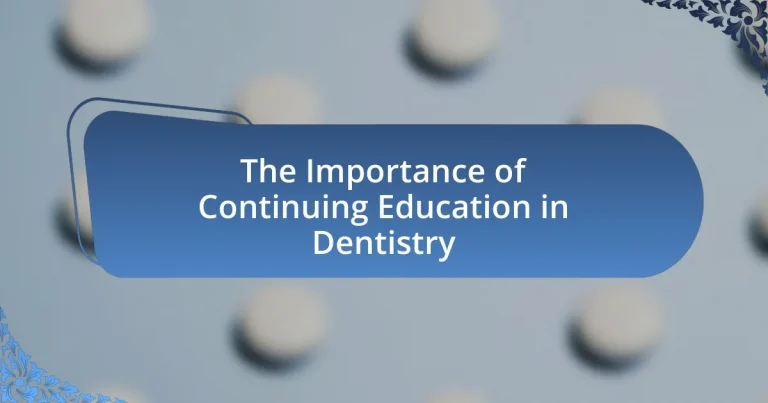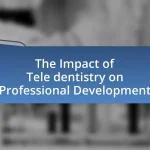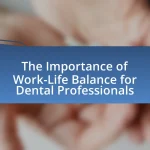Continuing education is essential in dentistry as it enables dental professionals to stay current with advancements, techniques, and best practices, directly influencing patient care quality. This article outlines the importance of ongoing education for maintaining licensure, enhancing clinical skills, and improving treatment outcomes. Key reasons for pursuing continuing education include staying updated with dental technologies, meeting licensing requirements, and fostering a culture of lifelong learning. The article also addresses the impact of continuing education on patient safety and satisfaction, the professional benefits for dentists, and the various formats and challenges associated with accessing these educational opportunities.
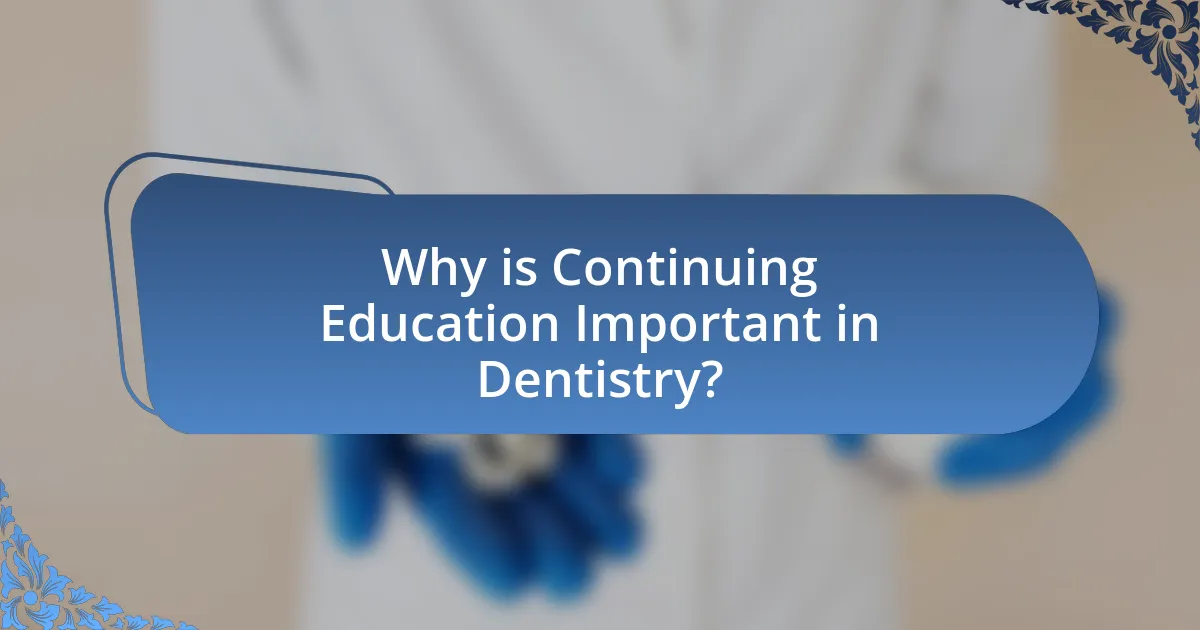
Why is Continuing Education Important in Dentistry?
Continuing education is important in dentistry because it ensures that dental professionals stay updated with the latest advancements, techniques, and best practices in the field. This ongoing education is crucial for maintaining licensure and enhancing clinical skills, which directly impacts patient care quality. For instance, a study published in the Journal of Dental Education found that dentists who engage in continuing education are more likely to adopt new technologies and treatment modalities, leading to improved patient outcomes. Additionally, the American Dental Association emphasizes that continuing education helps practitioners meet the evolving needs of their patients and the healthcare system, thereby fostering a culture of lifelong learning and professional development in dentistry.
What are the key reasons for pursuing continuing education in dentistry?
The key reasons for pursuing continuing education in dentistry include staying updated with advancements in dental technology, improving clinical skills, and meeting licensing requirements. Continuing education allows dental professionals to learn about new techniques, materials, and treatments, which enhances patient care and outcomes. For instance, the American Dental Association emphasizes that ongoing education is essential for maintaining competency and adapting to changes in the field, as dental practices evolve rapidly with new research and innovations. Additionally, many states require dentists to complete a certain number of continuing education hours to maintain their licenses, ensuring that practitioners remain knowledgeable and compliant with current standards.
How does continuing education enhance clinical skills?
Continuing education enhances clinical skills by providing dental professionals with updated knowledge and techniques essential for effective patient care. This ongoing learning process allows practitioners to stay current with advancements in dental technology, treatment methodologies, and best practices. For instance, studies have shown that dental professionals who engage in continuing education are more likely to adopt new technologies, such as digital imaging and minimally invasive procedures, which can improve patient outcomes and satisfaction. Furthermore, a survey conducted by the American Dental Association indicated that 90% of dentists believe that continuing education positively impacts their clinical performance, reinforcing the importance of lifelong learning in maintaining high standards of care.
What role does continuing education play in staying updated with dental technologies?
Continuing education plays a crucial role in helping dental professionals stay updated with the latest dental technologies. It provides structured opportunities for dentists to learn about advancements in techniques, tools, and materials, ensuring they can offer the best care to their patients. For instance, a study published in the Journal of Dental Education found that 75% of dentists who participated in continuing education reported improved clinical skills and knowledge of new technologies. This ongoing learning process is essential for maintaining competency and adapting to the rapidly evolving landscape of dental care.
How does continuing education impact patient care?
Continuing education significantly enhances patient care by ensuring dental professionals stay updated with the latest advancements in techniques, technologies, and treatment protocols. This ongoing learning process equips practitioners with current knowledge, which directly translates to improved clinical outcomes and patient safety. For instance, a study published in the Journal of Dental Education found that dentists who engage in continuing education are more likely to adopt evidence-based practices, leading to higher patient satisfaction and better health results. Additionally, continuing education fosters critical thinking and problem-solving skills, enabling dental professionals to address complex cases more effectively, thereby enhancing overall patient care quality.
In what ways does ongoing education improve treatment outcomes?
Ongoing education improves treatment outcomes by ensuring dental professionals stay updated with the latest techniques, technologies, and evidence-based practices. This continuous learning enhances their clinical skills and knowledge, leading to more effective patient care. For instance, a study published in the Journal of Dental Education found that dentists who participated in continuing education courses demonstrated significantly improved diagnostic accuracy and treatment planning compared to those who did not engage in ongoing education. Additionally, ongoing education fosters a culture of lifelong learning, which encourages practitioners to adopt innovative approaches and improve patient communication, ultimately resulting in higher patient satisfaction and better health outcomes.
How does it contribute to patient safety and satisfaction?
Continuing education in dentistry significantly contributes to patient safety and satisfaction by ensuring that dental professionals remain updated on the latest techniques, technologies, and best practices. This ongoing training reduces the likelihood of errors and enhances the quality of care provided to patients. For instance, studies have shown that practitioners who engage in continuing education are more adept at identifying and managing complications, leading to improved patient outcomes. Furthermore, when dentists are knowledgeable about current advancements, they can offer patients more effective treatment options, which increases patient satisfaction and trust in their care.
What are the professional benefits of continuing education for dentists?
Continuing education for dentists enhances their professional skills, knowledge, and practice efficiency. By participating in ongoing training, dentists stay updated on the latest advancements in dental technology, treatment methodologies, and regulatory changes, which directly improves patient care. Research indicates that dentists who engage in continuing education report higher levels of job satisfaction and are more likely to adopt innovative practices, leading to improved patient outcomes. For instance, a study published in the Journal of Dental Education found that 85% of dentists who pursued continuing education felt more competent in their clinical skills, demonstrating the tangible benefits of lifelong learning in the dental profession.
How can continuing education influence career advancement?
Continuing education significantly influences career advancement by enhancing professional skills and knowledge, which can lead to better job opportunities and promotions. In the field of dentistry, for instance, practitioners who engage in ongoing education are often more competitive in the job market, as they stay updated with the latest techniques and technologies. According to a study published in the Journal of Dental Education, 75% of dental professionals who pursued continuing education reported improved clinical skills and increased confidence in their practice, directly correlating with career progression. This ongoing learning not only meets licensing requirements but also demonstrates a commitment to professional development, making individuals more attractive to employers and potentially leading to higher salaries and leadership roles.
What certifications or credentials can be obtained through continuing education?
Continuing education in dentistry offers various certifications and credentials, including the American Dental Association (ADA) Continuing Education Recognition Program (CERP) certification, state licensure renewal credits, and specialty certifications such as those from the American Board of Orthodontics or the American Board of Periodontology. These credentials validate a dentist’s commitment to professional development and adherence to current standards in dental practice. For instance, the ADA CERP certification ensures that the continuing education provider meets specific quality criteria, enhancing the credibility of the courses taken.
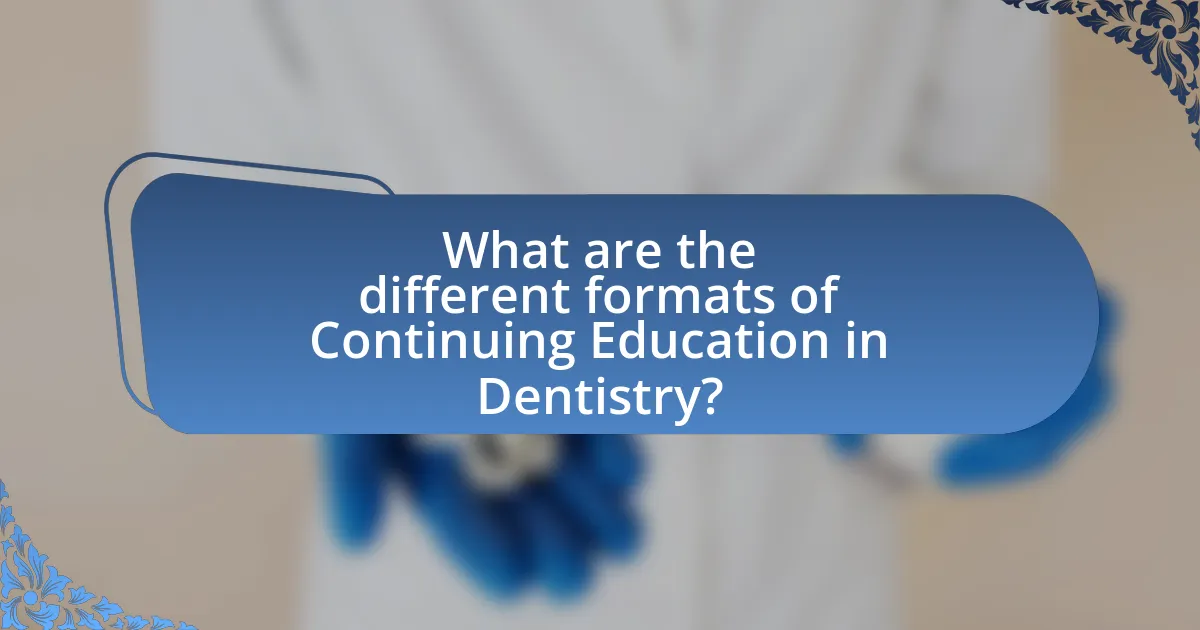
What are the different formats of Continuing Education in Dentistry?
The different formats of Continuing Education in Dentistry include live seminars, online courses, workshops, webinars, and conferences. Live seminars provide in-person learning experiences, while online courses offer flexibility for dental professionals to learn at their own pace. Workshops focus on hands-on training, allowing participants to practice skills in real-time. Webinars are interactive online sessions that facilitate learning from experts without geographical constraints. Conferences gather professionals for networking and knowledge sharing on the latest advancements in dentistry. These formats are essential for maintaining licensure and staying updated with evolving practices and technologies in the field.
What types of continuing education programs are available for dentists?
Continuing education programs for dentists include various types such as workshops, online courses, seminars, and conferences. These programs are designed to help dental professionals stay updated on the latest techniques, technologies, and regulations in the field. For instance, the American Dental Association (ADA) offers a range of online courses that cover topics from clinical skills to practice management, ensuring that dentists can enhance their knowledge and skills effectively. Additionally, state dental boards often require a certain number of continuing education credits for license renewal, emphasizing the importance of these programs in maintaining professional standards.
How do online courses compare to in-person workshops?
Online courses offer flexibility and accessibility, while in-person workshops provide hands-on experience and direct interaction. Online courses allow participants to learn at their own pace and from any location, which is particularly beneficial for busy dental professionals. In contrast, in-person workshops facilitate immediate feedback and networking opportunities, enhancing practical skills through direct engagement. Research indicates that 70% of learners prefer the convenience of online education, yet 80% of participants in a study by the American Dental Association reported that in-person workshops significantly improved their practical skills. This data underscores the strengths and weaknesses of both formats in the context of continuing education in dentistry.
What are the benefits of attending dental conferences and seminars?
Attending dental conferences and seminars provides numerous benefits, including enhanced knowledge, networking opportunities, and exposure to the latest advancements in dental technology. These events allow dental professionals to learn from experts in the field, participate in hands-on workshops, and gain insights into best practices and emerging trends. For instance, a study published in the Journal of Dental Education found that continuing education through conferences significantly improves clinical skills and knowledge retention among dental practitioners. Additionally, networking at these events fosters collaboration and mentorship, which can lead to career advancement and improved patient care.
How can dentists choose the right continuing education program?
Dentists can choose the right continuing education program by assessing their specific learning needs and career goals. They should evaluate programs based on accreditation, relevance to their practice, and the qualifications of the instructors. Research indicates that accredited programs, such as those recognized by the American Dental Association, ensure quality and relevance, which is crucial for effective learning. Additionally, dentists should consider the format of the program, whether in-person or online, to match their learning preferences and schedules. By aligning their choices with these criteria, dentists can enhance their skills and knowledge effectively.
What factors should be considered when selecting a course?
When selecting a course in dentistry, factors such as course content, accreditation, instructor qualifications, and relevance to current practice should be considered. Course content must align with the latest advancements and techniques in dentistry to ensure that practitioners gain applicable knowledge. Accreditation from recognized bodies, such as the American Dental Association, validates the course’s quality and ensures it meets industry standards. Instructor qualifications, including their experience and expertise, significantly impact the learning experience and the credibility of the course. Lastly, the relevance of the course to the practitioner’s specific area of interest or practice is crucial for enhancing skills and knowledge that can be directly applied in their work.
How can dentists assess the credibility of continuing education providers?
Dentists can assess the credibility of continuing education providers by verifying their accreditation status and reviewing the qualifications of the instructors. Accreditation from recognized bodies, such as the American Dental Association or state dental boards, ensures that the provider meets established educational standards. Additionally, examining the professional backgrounds and expertise of the instructors can provide insight into the quality of the education offered. Research indicates that accredited programs are more likely to deliver relevant and high-quality content, which is crucial for effective professional development in dentistry.
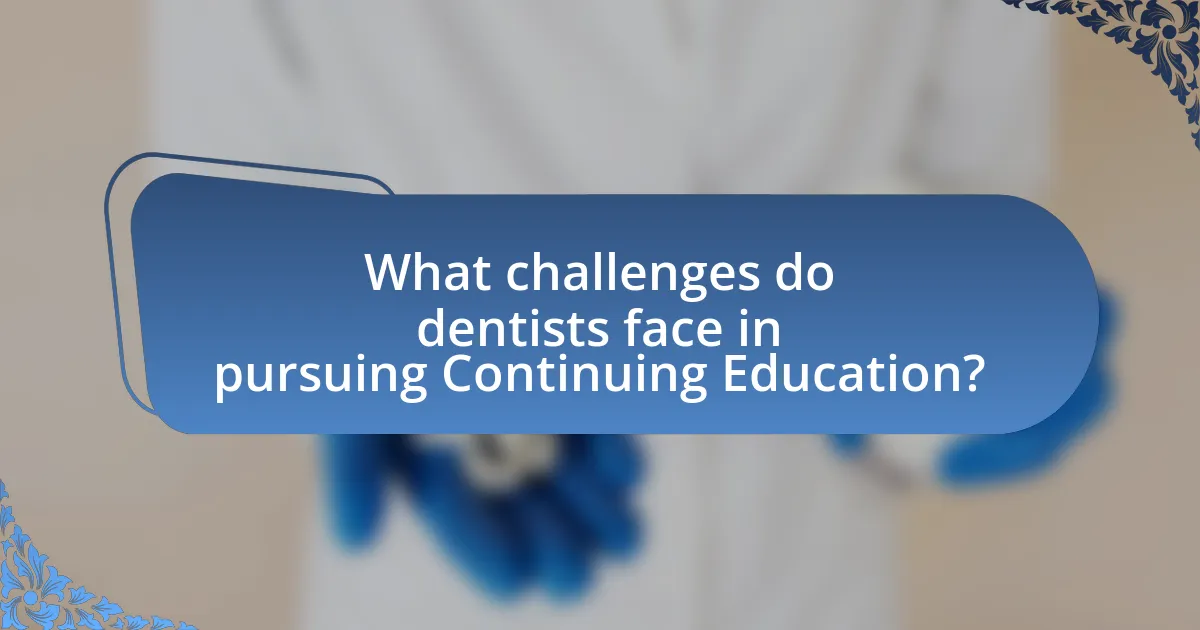
What challenges do dentists face in pursuing Continuing Education?
Dentists face several challenges in pursuing Continuing Education, including time constraints, financial costs, and varying quality of available courses. Time constraints arise from the demanding schedules dentists maintain, which often limit their ability to attend courses. Financial costs can be significant, as many Continuing Education programs require substantial fees that may not be covered by insurance or employer reimbursement. Additionally, the quality of courses can vary widely, making it difficult for dentists to identify programs that provide valuable, evidence-based information. According to a survey by the American Dental Association, 60% of dentists reported that finding time for Continuing Education was a major barrier, while 45% cited costs as a significant concern.
What are common barriers to accessing continuing education?
Common barriers to accessing continuing education include financial constraints, time limitations, lack of institutional support, and geographic location. Financial constraints often arise from high tuition fees or costs associated with materials and travel, making it difficult for dental professionals to invest in their education. Time limitations are significant, as many practitioners balance demanding work schedules and personal commitments, leaving little room for additional training. Lack of institutional support can hinder access, as some employers may not prioritize or fund continuing education opportunities for their staff. Geographic location also plays a role, as professionals in rural or underserved areas may have limited access to educational resources and programs. These barriers collectively impact the ability of dental professionals to pursue ongoing education, which is essential for maintaining competency and improving patient care.
How do time constraints affect participation in continuing education?
Time constraints significantly reduce participation in continuing education for dental professionals. Limited availability due to work commitments, family responsibilities, and personal obligations often leads to prioritization of immediate tasks over educational opportunities. A study published in the Journal of Dental Education found that 60% of dentists cited time limitations as a primary barrier to engaging in continuing education programs. This indicates that without flexible scheduling or accessible formats, many dental professionals may miss out on essential training and updates in their field.
What financial considerations should dentists keep in mind?
Dentists should keep in mind the costs associated with continuing education, which can significantly impact their financial planning. Continuing education courses often require substantial investment, with fees ranging from hundreds to thousands of dollars annually, depending on the program and institution. Additionally, dentists must consider the potential loss of income during the time spent in training, as they may need to take time off from their practice. According to the American Dental Association, investing in continuing education can lead to increased practice revenue through enhanced skills and services offered, making it a critical financial consideration for long-term success.
How can dentists overcome these challenges?
Dentists can overcome challenges in their field by actively engaging in continuing education programs. These programs provide updated knowledge on the latest dental techniques, technologies, and best practices, which are essential for maintaining high standards of patient care. For instance, a study published in the Journal of Dental Education found that dentists who participate in continuing education are more likely to adopt new technologies and improve their clinical skills, leading to better patient outcomes. By prioritizing ongoing learning, dentists can effectively address evolving challenges in the dental industry.
What strategies can be employed to balance work and education?
To balance work and education effectively, individuals can employ strategies such as time management, prioritization, and flexible scheduling. Time management involves creating a structured schedule that allocates specific hours for work, study, and personal activities, which helps in maintaining a clear focus on tasks. Prioritization allows individuals to identify urgent and important tasks, ensuring that critical deadlines are met without compromising educational commitments. Flexible scheduling, such as taking online courses or adjusting work hours, enables learners to adapt their education to fit their professional responsibilities. Research indicates that professionals who utilize these strategies report higher satisfaction and success in both work and educational pursuits, demonstrating their effectiveness in achieving a balance.
How can dental practices support their staff in continuing education efforts?
Dental practices can support their staff in continuing education efforts by providing financial assistance for courses, offering flexible scheduling to accommodate learning, and creating a culture that values professional development. Financial support can include reimbursement for tuition or fees associated with accredited dental education programs, which encourages staff to pursue further qualifications. Flexible scheduling allows employees to attend classes or training sessions without conflicting with their work responsibilities, thereby promoting participation. Additionally, fostering a culture that prioritizes ongoing education can motivate staff to engage in learning opportunities, as seen in practices that regularly discuss and celebrate educational achievements, leading to improved skills and patient care outcomes.
What are best practices for maximizing the benefits of Continuing Education in Dentistry?
To maximize the benefits of Continuing Education in Dentistry, dental professionals should actively engage in relevant courses, workshops, and seminars that align with their specific practice needs and interests. Engaging in hands-on training and interactive learning experiences enhances skill acquisition and retention, as evidenced by studies showing that practical application leads to better outcomes in clinical settings. Additionally, networking with peers during these educational events fosters collaboration and knowledge sharing, which is crucial for staying updated on industry advancements. Regularly assessing personal learning goals and seeking feedback from mentors can further refine the educational experience, ensuring that it meets both professional and patient care standards.
How can dentists effectively integrate new knowledge into their practice?
Dentists can effectively integrate new knowledge into their practice by actively participating in continuing education programs and applying evidence-based practices. Engaging in workshops, seminars, and online courses allows dentists to stay updated with the latest advancements in dental techniques and technologies. For instance, a study published in the Journal of Dental Education found that practitioners who regularly attend continuing education courses report improved clinical skills and patient outcomes. Additionally, implementing new knowledge through peer collaboration and mentorship can enhance the practical application of learned concepts, ensuring that dentists not only acquire knowledge but also translate it into effective patient care.
What resources are available for ongoing learning and development in dentistry?
Ongoing learning and development in dentistry can be supported through various resources such as professional associations, online courses, workshops, and peer-reviewed journals. Professional associations like the American Dental Association (ADA) offer continuing education programs and resources that keep dental professionals updated on the latest practices and technologies. Online platforms such as Coursera and DentalTown provide access to a wide range of courses tailored to different specialties within dentistry. Workshops and hands-on training sessions are often organized by dental schools and industry conferences, allowing practitioners to gain practical experience. Additionally, peer-reviewed journals like the Journal of the American Dental Association publish research and advancements in the field, serving as a valuable resource for ongoing education.
